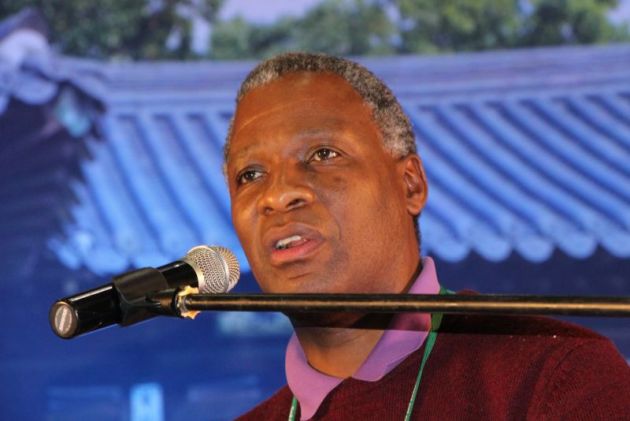South African archbishop shines light on world, showing how Christmas message should 'empower' people

The politics of radical exclusion that prevailed at the time of Christ's birth are reflected in realities in South Africa and also across much of the world, the Anglican Archbishop of Cape Town has told worshipers in a Christmas sermon.
Archbishop Thabo Makgoba said during his midnight Mass sermon on Dec. 24 at St. George's Cathedral he wanted to begin with a focus on the marginalized, those on the fringes of society as his sermon touched on world hotpots.
He cited the story telling how the rich children get even more, while the poor receive the least, saying it "describes an overwhelming reality for many people in many places, and it breaks our hearts" as he said the Christmas message should "empower" people.
"That story, the story of many parts of our city, of our nation, and of the world, is also the story of the lives of the shepherds," about whom the congregant had heard in their Gospel reading.
"Global financial crises, from which corporations and banks emerge as too big to fail, while the rich get richer and the poor get poorer, undermine confidence in established democracies, spawning populist authoritarian leaders," said Makgoba.
That in turn diminishes respect for human rights and undermines social cohesion.
"No systemic approach, no ideology seems to offer viable solutions," said the South African Anglican leader, the successor to the legendary Desmond Tutu.
"At the same time, the relative world peace which prevailed in the second half of the 20th century has been replaced by regional wars which threaten to metastasize like an aggressive cancer," said Makgoba.
He cited, in his continent, Africa the hunger and violence in Sudan and South Sudan that grows worse daily, children dying from hunger, and the Democratic Republic of Congo that echoes with the cries of conflict.
"In the Middle East, the names of places we recognize from the Christmas story in the Bible are now associated with the depraved horrors of war, crimes against humanity, and genocide," said Makgoba.
DAMASCUS, THE CITY OF ST. PAUL
"Bethlehem in the Occupied West Bank is still under brutal occupation. Tyre in Lebanon has been bombed and invaded. Damascus, the city of St Paul, is now rid of its dictator but is being bombed by its neighbor."
Syria's future is threatened by the rivalries of great powers, which seek to draw the new government into their orbits.
He said that the ceasefire with Hezbollah in Lebanon is, with some exceptions, holding, emboldened him to call once again for an unconditional ceasefire in Gaza, for the ceasefire in Lebanon to be fully respected, and for Syria to be allowed to develop a democratic government, accountable only to its citizens.
Turning to South Africa, where huge inequalities still exist since the collapse of apartheid in the 1990s, he said he has hope.
"In the midst of loud noises and headlines, the Government of National Unity is holding so far, and if the various foundations established in the names of our best leaders of the past manage to bring their influence to bear, there is every prospect of the proposed National Dialogue getting off the ground," said Makgoba.
"If that happens, 2025 can become a year of transformation."
He warned, however, that if such a dialogue is to provide solutions to the country's urgent and deep-seated problems, "it cannot be a gathering of elites, and the politicians need to take a back seat."
It must be a conversation in which ignored voices, including the unemployed, find their agency, in which marginalized people speak for themselves and articulate their situations, share their dreams, offer solutions, and take back their political and economic power.
"No one can be left out of the process," said Makgoba, who referred to studies showing that huge disparities in economic wealth and potential still exist between the white minority and the black majority.
CRISIS FOR YOUNG SOUTH AFRICANS
The most urgent issue to address is the crisis facing young South Africans.
"We desperately need a coherent, transparent and measurable strategy to empower young people by building their capabilities and creating access to opportunities for engagement," said Makgoba.
"To do this, our religious institutions, our communities, our business partners, and our government must adopt a comprehensive view of their needs."
For South Africa to survive, it has to deliver on the promise of economic, civic, and social activities that foster livelihoods, and political participation, and establish youth-to-youth connections to combat risky behaviors while fostering positive development.
ACADEMIC SKILLS NOT ENOUGH
"Academic and vocational skills are not enough. Young people from poor communities also need to learn life skills to take care of their health, make informed decisions, develop relationships, and solve problems.
"Adult support from role models, coaching, and encouragement are often lacking."
The archbishop said that the "New Struggle" aims to build innovative new programs, partnering with South African industry and commerce, to start transforming inequality into equality of opportunity.
"As we celebrate the birth of the Prince of Peace, there is no reason to despair. For we know that true peace is based on the establishment of justice, and if we are to realize the promise of Christmas, we need to re-dedicate ourselves to working for justice," said Makgoba.